PLENARY
SESSIONS
Plenary Session I (Wednesday, 13
Sept, 14.30 – 15.30) Chair:
Arne Jakobsson (Norway)
- M. Anibaba
(Romania):
Modern librarians
- M. Acalovschi
(Romania):
E-publishing develops rapidly in Romania:
the experience of a recently established medical journal

Plenary
Session II (Thursday, 14 Sept, 9.00 - 10.00) Chair:
Suzanne Bakker (The Netherlands)
- M. Fishel,
B. Lyon (USA): Development of PubMed
Central, back issue scanning project, NLM’s
open access NIH manuscript project
- R. Kiley
(UK): Open
access: a funder's perspective

Plenary
Session III (Friday, 15 Sept, 9.00 - 10.00) Chair:
Elisabeth Husem (Norway)
- F. Pasleau (Belgium
):
Easy access to medical literature: are users’ habits changing?
Is it a threat to Science quality?
- G. van den Brekel
(Netherlands):
Into the User Environment now!: How
the users changed and how the libraries can adjust


PARALLEL SESSIONS
Parallel
Session I (Wednesday, 13 Sept, 15.30 – 16.30)
Ia
(Access to publications) Chair: Maurella
Della Seta (Italia)
- A. Parrical
(Switzerland
):
Use of free web ressources to locate
medical documents: examples taken from the CHUV library


- F. Rump (Germany
):
Searchin’? – Got the Dot Com Blues? – here is a Remedy 

- I. Le Bis,
S. Devaux, G. Lewison,
O. Grimaud, A.E. Clarke, A. Gatine
(France): Assessing European public health research
through a bibliometric analysis: Methods used for the SPHERE project
Ib
(Library informatics) Chair: Astrid Müller (Norway)
- P. Chalon,
L. Alexandre-Joaquim , C. Naget,
C. Becquart (Belgium
)
: Open your mind! Selecting and implementing an integrated
library system: the open-source opportunity slides , text
, text
- G. Karacsony,
E. Jofoldi (Hungary):
Utilizing Diverse Internet Resources for Scientific Research
with a Metasearch Clustering Engine 

- B. Madge, A. Gilles
(UK): Knowledge management for primary care:
a difficult case?


Ic
(Education and learning) Chair: Linda Lisgarten (United
Kingdom)
- B. Niedzwiedzka
(Poland
):
Searching skills training may not be enough. Experiences
from information competency program 

- T. Heino
(Finland):
Information and Communication Technology (ICT) Driving
License at the University
of
Helsinki 

- E. Padar
(Hungary):
Library informatics: an online course for distance learners
by the Veterinary Science Library


Id (History of medicine) Chair:
Tony McSean (United
Kingdom)
- L. Kozuma,
S.
Greenberg (USA):
IndexCat – Content and Relevance for non-English Sources in
the History of Medicine
- A. M. Gherman
(Romania):
The Romanian Enlightenment in Transylvania
and in medicine
- M. Teissier
(France):
A brief history of the World Organisation for Animal Health
(OIE)


Parallel
Session II (Thursday, 14 Sept, 14.00 - 15.30)
IIa
(Access to publications) Chair: Barbara Niedzwiedzka (Poland)
- E. Poltronieri,
C. Morciano, T. Niglio,
C. Sellitri, R. Solimini (Italy):
Setting-up an institutional repository at the Italian National
Institute of Health: results from a survey 

- A. Chaleplioglou
(Greece): Digital medical libraries: a step
ahead for Open Access 

- A. Lawton (Ireland):
Creating a digital media archive of Irish health information 

- M. Wilhelm, O. van
Staveren (Netherlands): Institutional repository
in a teaching hospital


IIb
(Our profession) Chair: Jelka
Petrak (Croatia)
- K. Austveg, H. Fossum, I. M. Juul, A. Munthe (Norway): A user satisfaction survey : the process of learning by doing 

- M. Heijmans,
H. Ket (Netherlands
):
Nursing the nurses’ literature: challenging you to become a
clinical librarian for nurses! 
- O. Riondet,
L. Stefanescu (France
):
The role of “information brokers” in therapeutics research 
- I.
Fourie, R. Claasen-Veldsman (South
Africa):
Exploring the need for current awareness services via the www:
oncology nurses as example

IIc
(Education and learning) Chair: Jarmila
Potomkova (Czech Republic)
- K. Buset,
S. Kvale (Norway): Increasing
information literacy at NTNU and St.Olavs
hospital - Implementation of an e-learning tool 

- M. Dozier, F. Brown
(UK): Strategic contacts for curricular integration
of information skills 
- I. Truccolo,
G. Cognetti, W. Russell-Edu,
A. Bogliolo (Italy):
Patients and cancer in the Internet age: guided pathways for
diseases 

- K. Czabanowska,
E. Nowak, E. Rys (Poland):
Improving English language performance of medical library professionals

IId
(Veterinary group session) Chair: Friedhelm Rump (Germany)
- L. Fruttini,
E. Piras, I. Massirio,
M. Bucciarelli, S. Guarise, L. Pitaro, E. Aliberti, A. D’Orazi, L. Lombardi, P. Gradito
(Italy): An open archive for II.ZZ.SS. publications 

- R. Iivonen, S. Suckcharoen, H. Myllys (Finland): Mentoring in the Viikki Science Library. Case: veterinary librarianship 

- K. Miszori,
B. Winkler (Hungary): Children of the information
society: a student survey for strategic planning 

- E. Piras,
R. Ciappelloni, L. Garau,
S. Guarise, A. D’Orazi,
M. Bucciarelli, F. Capuano, E. Aliberti,
L. Lombardi, P. Gradito (Italy): Prevention
in livestock diseases in Italy: history and records 

Parallel
Session III (Friday, 15 Sept, 10.30 - 11.30)
IIIa
(Access to publications) Chair: Marta Viragos (Hungary)
- I.
Schoedt, H. Christensen, C. Skrubbeltrang
(Denmark):
How to establish good and equal access to electronic
resources for health care personnel in Danish health libraries
- J-P. Lardy, S.
Dalhoumi,
O. Larouk (France):
Open access at the University
of Lyon
:
a comparative and disciplinary approach 

- M. Parakova,
H. Bouzkova, J. Potomkova,
E.
Lesenkova
(Czech Republic):
A multi-institution collaborative project filling vital information
needs of biomedical research community


IIIb
(Information policy) Chair: Eva Alopaeus
(Sweden)
- L. Dorrington
(UK):
The development of an information policy for Imperial
College London medical library
- L. Qafoku
(Albania):
The introduction of EBL principles and the start of their application
in Albania
- M. Krog
(Norway):
Marketing library services – our way of doing it

IIIc
(Searching tools) Chair: Anne Parrical
(Switzerland)
- M. Della Seta, R.
Cammarano (Italy
):
Google Scholar and Science Citation Index: analogies
and differences in citation analysis of scientific publications 

- L. Iselid
(Sweden):
Critical assessment of Web of Science, Scopus and Google
Scholar
- S. Bakker
(Netherlands):
Scientometric and bibliometric tools

IIId (WHO group session) Chair: Päivi Pekkarinen (Finland)
- T. Allen (Switzerland):
Global Health Library - A WHO Initiative for Access to Health
Knowledge 

- A. Dumitrescu
, M. Ghitoc, D. Berluteau
Tsouros (Denmark): Electronic publishing for
public health 
- T. Kaigorodova
(Russia): Guidelines on using of WHO web-resources
to improve access for Russian speaking consumers 
Parallel
Session IV (Friday, 15 Sept, 14.00 - 15.00)
IVa
(Library informatics) Chair: Patricia Flor (Norway)
- M. Calonge
Contreras, G. Powell (UK
):
The National Public Health Language 

- E. Giesenhagen,
H-P. Dauben (Germany
):
Trusting the evidence – the quality question 
- J. Vejvalka
(Czech
Republic):
Documenting the semantics of medical data


IVb
(Information policy) Chair: Francisca Maria Ribes Cot (Spain)
- I. de Kaenel
(Switzerland): Interlibrary loan and document
delivery: a new deal in the “big deals” era 
- R. Ferrara,
D. Gentili, V. Ponzani
(Italy): How “free” we are: Survey of the Italian
policy in the document supply service 

- J. Harrison, S. Nikoi
(UK): “Click , click quick ” an electronic acute
services current awareness service for the NHS


IVc
(History of medicine) Chair: Meilė
Kretavičienė (Lithuania)
- J-F. Vincent (France):
History of medicine and Internet at the Bibliotheque
Interuniversitaire de Medecine et
d’Odontologie 

- P. De Castro, M. Di
Benedetto, S. Modigliani, F. Napolitani,
A. M. Rossi, S. Salinetti, A. Spurio
(Italy): Preserving historical memories in scientific
institutions: the experience of the National Institute of Health
in Italy
- C. Barsu
(Romania): V.L. Bologa
– Founder of the Cluj medical books
historical collection 
IVd
(Our profession) Chair: Donna Flake (USA)
- T. Ovaska
(Finland
):
The Possibilities of Horizontal Career Development and the Changing
Roles of Librarians 
- D. Eskildsen
Stenbaek (Denmark
):
How do you nurse your journal collection? 

- J.
Ginestet, G. F. Miranda (France): Information professional in a fast
growing environment. How we are able to keep the challenge?
ABOUT
EMPOWERMENT
For
the first time an EAHIL conference will feature 2 Empowerment
sessions in addition to parallel sessions. This idea was formed
by Eva Alopaeus (Sweden) and Patricia Flor (Norway) as an opportunity
for participants to discuss, in depth, certain topics in an
interactive environment.
What
is an empowerment session?
The purpose of an empowerment session is to give an overview
for participants with different levels of experience with the
topic in question. An empowerment session can be in the form
of a continuing education course, a lecture, or a mixture of
these presentation forms. It will be practical rather than theoretical
in nature. There will be altogether 6 empowerment sessions on
different subjects, relevant and current for all medical librarians.
The facilitators are all well known names in EAHIL with excellent
experience in their chosen subjects.
Empowerment
Session 1 : Thursday September
14, 10.30 – 11.30 am
Session A
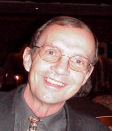 |
Establishing
an Institutional Repository: A Step by Step Approach
Arne Jakobsson, University of Oslo Library. Library of Medicine
and Health Sciences.
E-mail: p.a.jakobsson@ub.uio.no |
Libraries are today engaged in
the creation and dissemination of knowledge. Our role has changed
from a manager of scholarly products to that of a participant
in the scholarly communication process. By setting up, promoting
and managing institutional repositories, libraries have created
a stable location where scientific information produced by the
institute can be preserved and disseminated. The institutional
repositories are OAI-compliant. OAI-PMH (Open Archives Initiative
- Protocol for Metadata Harvesting) defines a mechanism for
data providers to expose their metadata. Service Providers use
metadata harvested via the OAI-PMH as a basis for building value-added
services. The challenge in setting up an institutional repository
is not a technological issue (although the problems of long-term
preservation are very far from being solved), but consists of
managerial, organizational and cultural issues. This session
will focus on the managerial, organizational and cultural issues.
In addition to the step by step approach, DUO – the e-print
repository for the University of Oslo and NORA (Norwegian Open
Research Archives) a national gateway for institutional repositories
in Norway will be presented.
Biography
Arne Jakobsson has, since 1 May 1999, been the Library Director
for the University of Oslo Library, Library of Medicine and
Health Sciences. He is project leader for DUO (www.duo.uio.no)
– the institutional repository at the University of Oslo
and for NORA – Norwegian Open Research Archives (www.ub.uio.no/nora/).
He is currently President of EAHIL (European Association for
Health Information and Libraries) (www.eahil.net).
Session B
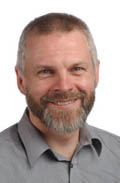 |
Use
of Weblogs by Libraries and Librarians
Oliver Obst, Zweigbibliothek Medizin, Universitäts-
und Landesbibliothek, MÜNSTER, Germany
E- Mail : obsto@uni-muenster.de |
Abstract
To be well informed and always up to date, you have to read
blogs and subscribe to RSS feeds in these days - especially
if you are an information specialist. This session will empower
you to start a weblog by your own. You learn about the many
ways weblogs could be used. We will take a tour through a number
of sucessful weblogs of libraries and librarians and look at
the differences. Weblogs can be used for your personal thoughts
or as a library homepage - there are endless and exciting possibilities
to integrate this tool into your daily live. We will discuss
the benefits of "blogging" - e.g. marketing, customer
relationship, reputation, visibility, community building.
Biography
Oliver Obst started his career as a researcher in cardiovascular
medicine before being attracted by library science. Currently
he is the head of the Central Medical Library of the University
and Regional Library Munster, Germany. He founded the Journal
"medicine, library, information" and for 13 years
he has initiated homepages, mailing lists, and weblogs related
to medical librarianship and also holds workshops in this domain.
Session
C
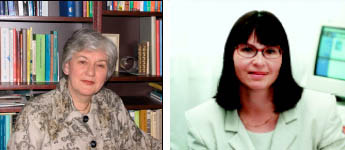 |
Accreditation
and Professional Development
Suzanne
Bakker (Netherlands) and Helen Bouzkova, (Czech Republic) |
Accreditation and Professional Development
Many parties might be involved (and could be called “stakeholders”) in the accreditation process of medical information professionals. EAHIL has noted a growing interest (both national and on a European level) and probably a need for professional accreditation in general, and also in the field of medical information professionals. EAHIL aims to organize the accreditation structure for medical librarians and information professionals in the medical, health, pharmaceutical and veterinary field (see also McSean & Salmi, JEAHIL 2005;1(2):14-15). In this respect the Bologna harmonizing project of education and the CERTIdoc initiative are important to establish the framework.
Criteria for accreditation must be set and acknowledged by stakeholders: e.g., we all would like to see our employers to appreciate our level of skills and knowledge and to show this in suitable job descriptions and payment. Health insurance companies must be convinced of the impact on the quality of patient care of information services, and governments as well should be aware of the need of these services for the quality of medical education and practice.
Where to start an accreditation process?
During this empowerment session we will discuss the possible roles and responsibilities of: individual healh information professionals, (national / medical) library associations and EAHIL.
Furthermore we will map the context of health librarianship and the developments that are important for the accreditation process, such as: international developments in health librarianship, developments in medicine (e.g. EBM), standards and accreditation systems for library education and courses, and cooperation with already existing accrediting bodies.
Depending on the (national) circumstances it could be wise to seek alliances with:
- medical professional bodies (quality of care)
- trade unions (employee organizations)
- employers (for appropriate job requirements, job descriptions, salaries and facilities for professional development)
- patient organizations (quality of care and patient information)
The course leaders will illustrate this by presenting examples from their home countries in this respect:
- for the Czech Republic:
 - benchmarking projects and the leading role of the National Medical Library
- benchmarking projects and the leading role of the National Medical Library
 - indicators for skills and knowledge of library staff
- indicators for skills and knowledge of library staff
 - European guidelines for education
- European guidelines for education
- for the Netherlands:
 -educational needs
-educational needs
 -continuing education courses
-continuing education courses
 -clinical librarianship
-clinical librarianship
Biographies:
Helena Bouzkova began her professional career as an information specialist in medical libraries in Hradec Kralové and Prague. She has been working as the Director of the National Medical Library in Prague since 1998. Her professional activities comprise participation in library associations and institutions and also in the organization of medical library cooperation in the Czech Republic in the area of quality evaluation of activities of public libraries, including the problems of professional education of medical librarians. She is a member of the EAHIL Board. e-mail: bouzkova@nlk.cz
Suzanne Bakker has been Library Director since 1984 of the medical libraries of the University of Nijmegen, the University of Amsterdam and since 1998 of the Netherlands Cancer Institute. She is an active member of the biomedical information group (BMI) of the Dutch Library Association (NVB), as Editor of the newsletter Biomeditaties and as Chair of the Continuing Education committee (see also: http://www.nvbonline.nl/bmi).
Empowerment
Session 2 : Friday September
15, 11.30 – 12.30 am
Session
A
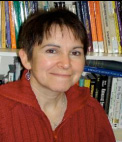 |
A
User-Friendly Approach to Becoming an Evidence Based Practitioner
Anne
Brice, Acting Head of Service, National Library for Health,
England
E-mail: anne.brice@dphpc.ox.ac.uk |
Abstract
What does evidence based practice mean? Are we doing it already?
How can we use some simple tools and techniques to improve our
use of research?
These and other questions will be covered in this brief introduction
to evidence-based practice, drawing on examples takenfrom practical
experience. Evidence-based practice involves applying the results
from research to our day-to-day practice as information staff,
in order to improve the service we provide our users. This topic
should be of interest to all information professionals, whether
new or established, and working in all areas and the session
will focus on providing some simple techniques that anyone can
apply. The session will also include some interaction from the
audience to prevent boredom and encourage collaboration!
Session
B
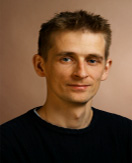 |
The
Hunt for the Perfect Interface in a Googlified World
Lars
Iselid, Librarian at the Umeå university Library,
Sweden.
E-mail: lars.iselid@ub.umu.se |
Abstract
Search engines as search tools are common everyday tools among
library users today, at least in the industrial world. Google
especially, whose remarkable success has made the verb googling
a common buzzword, has set the standard for searching. Its clean-cut
interface and search solutions have today a great impact on
people’s information seeking behaviour. What should libraries
think about when building or buying interfaces in today’s
googlified world? How should libraries reach a perfect interface
for their patrons? Is a perfect interface a possibility or just
a utopian dream? Why have libraries in the digital world left
the power of the interfaces to Google and other vendors, which
they did not do earlier in the printed world?
Biography
Lars Iselid is the co-founder of the search engine blog Internetbrus.com.
He is the co-author of a Swedish textbook on searching the Internet
and also a freelancing journalist for Swedish library and computer
magazines.
Session
C
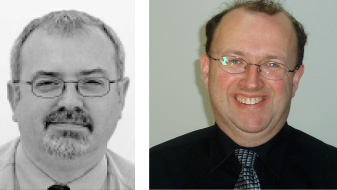 |
An
Introduction to Consumer Health Informatics and New Methods
of Delivering Information to Patients
Bruce Madge, Sub Librarian, British Medical Association.
E-mail: bruce.madge@bma.org.uk
Professor Alan Gillies, Professor of Information Management,
University of Central Lancashire.
E-mail: acgillies@uclan.ac.uk |
Abstract
This empowerment session will introduce delegates to the principles
of consumer health informatics and some of the more useful websites
that make information accessible to patients. We will also look
at some new technologies that will help patients access relevant
and useful information about their own conditions and treatments.
Biographies
Bruce Madge is a librarian with 30 years experience in the health
sector. He has worked in the area of health informatics for
a number of years and due to this, is currently serving on the
Council of UKCHIP. Before coming to his current post at the
BMA Library, he was employed as Assistant Director for Patient
Information at the newly established National Patient Safety
Agency. In 1995 he was appointed as Head of Healthcare Information
at the British Library where he had a national profile and managed
a number of projects. He has also worked in NHS Libraries for
a number of years. He is currently Chair of the Health and Biosciences
Libraries Committee of IFLA and a member of EAHIL Council.
Alan
Gillies has been Professor of Information Management at the
University of Central Lancashire since 1994. His PhD, probably
the first to be awarded by the University of Central Lancashire
in 1992, was in problem solving methodology using knowledge
based systems. After nearly five years at Salford University
in what is now the ISI, he returned to Preston, and in 1998
joined the newly formed Lancs. Postgrad. School of Medicine
and Health. In 2001 was awarded Doctor Honoris Causa by the
University of Medicine and Pharmacy in Cluj Napoca. Alan is
a Fellow of the BCS and has been involved with UKCHIP since
its inception.
POSTER PRESENTATIONS
1.
F. Kriz (Czech Republic): Electronic resources
management in national medical library Prague:opportunities,
tools, practices 
2. H. Markulin (Croatia): Evidence-based answering
service : A Croatian experience 
3. D. Zdenkova (Czech Republic): One short
paragraph of medical information open book – Czech Republic
and its Pilsner region 
4. S. Pizzarelli, F. Napolitani (Italy): Google
Book search: an in-depth, innovative discovery tool for printed
books
5. M. R. Bateni (Iran): The study of ideas
of Esfahan University of Medical Sciences, research project
executers in 2004.
6. F. Bolkunova (Uzbekistan): The priorities
of the medical library
7. L. Maixnerova, L. Curinova, S. Krysl (Czech Republic):
Historical book collections processing in the National Medical
Library of Czech Republic 
8. P. Saraiva, E. Clamote (Portugal): 191 Years
of the Lisbon Faculty of Medicine Library
9. N. Trzan-Herman, D. Poljansek (Slovenia):
Medicinal history in Lavicka library-collection in Slovenia
10. M. Vugrin, R. Wood (USA): Opening Pandora’s
Box: Redux. An Exercise in Inventorying Special Collections
11. V. Scutaru, C. Bonciu (Romania): How Internet
is used for searching medical information at the Medical University
Library of Iasi 
12. C. Bonciu, V. Scutaru (Romania): Resource
acquisition in the health sciences library. Combining traditional
and modern methods 
13. C. Ferri, G. Loffredo, P. Gradito, A. I. Bozzano
(Italy): Knock, knock… knocking on our users’
door… Information policy at Istituto Zooprofilattico Sperimentale
delle regioni Lazio e Toscana: A case study 
14. M. Meira (Portugal): When The Library is
not a priority at a biomedical research institute: defining
a strategic plan in a period of change
15. M. Sieradzka-Fleituch, L. Stalmach, A. Uryga (Poland):
Harmony of contrasts - distant library on the desk
16. R. Coravu, A. Rapeanu, C. Dovinca (Romania):
Central University Library “Carol I” of Bucharest
– A paradigm shift
17. I. LeBis, S. Devaux, O. Grimaud, G. Lewison, M.
Gatineau, N. Roberts, A. Clarke (France): Assessing
European public health research though a bibliometric analysis
: methods used for the SPHERE project
18. A. Simova, L. Maixnerova (Czech Republic):
The online Czech Translation of MeSH 
19. I. Aciu, D. Marineanu, G. Pirjol, S. Wood-Lamont
(Romania): Medical libraries and librarians in Romania.
An overview
20. S. Goldbolt (UK): Building partnerships
in health information. New strategies and new horizons
21. J. van Meel, S. Janssen, L. Lohstroh, M. Emmerzaal
(Netherlands): Plan, do, act, CHECK: our user satisfaction
survey
22. K. Wockats (Sweden): Library and arts for
young patients at Sahlgrenska University Hospital, Göteborg,
Sweden
23. P. Parodi, M. Della Seta, M. C. Calicchia (Italy):
A model of public health information in Europe: the avian influenza
24. A. Fassina, G. Bertin, M. Consuma (Italy):
Electronic information resources: impact on physicians and healthcare
professionals using CME curricula 
25. A. Drdulova (Czech Republic): Education
of the user of public information services provided by the specialised
library of the NCON
26. M. Hopeakoski-Nurminen, A. Uusitalo, P. Helminen,
T. Oker-Blom (Findland): Assurance of the quality of
user education in Viikki Science Library
27. M. Hopeakoski-Nurminen, T. Oker-Blom (Findland):
Student feedback on teaching information retrieval
28. L. Puia, I. Aciu, S. Wood-Lamont, I. Robu (Romania):
User education: from induction tours to university curriculum.
Case presentation
29. B. Mauer-Gorska (Poland): Health promotion
as the activity of public and school libraries
30. D. Pieri, R. Sato, P. Mazzon, L. Meggiorn (Italy):
In the fog? Use the library blog! 
31. A. Miguel Alonso (Spain): Development of biosanitary knowledge in 19thc Spain through theses in the Complutense University Madrid 
32. R. Iivonen, A. Uusitalo, M. Hopeakoski-Nurminen (Finland): Pharmaceutical and veterinary information services in Viikki Science Library
33. C. Fraga Medin, C.B. Canales, S.H. Villegas(Spain): SciELO-Spain: Open Access to Scientific Information
Scientific Programme Awards
There will be four prizes given at the 10th EAHIL conference:
Best Oral Presentation overall
Best Oral Presentation from a participant under 40 years old
Best Poster overall
Best Poster from a first -timer at an EAHIL Conference
The prizes will be as follows:
A trophy and 300 euros for each of the oral presentation awards
A trophy and 200 euros for each of the poster presentation awards
Benoit Thirion (Chair of the IPC) has assembled an international team of evaluators who will attend at least two sessions each, throughout the Scientific Programme. The evaluation criteria used are:

